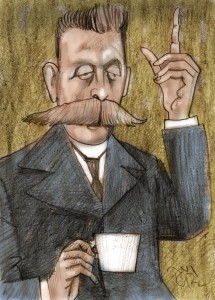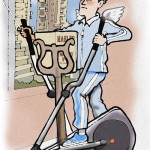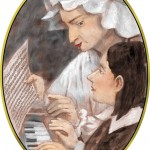10 July 1922
To the editor of Kuntres:
My fellow music lovers in the Yishuv, tilling the land and laboring on the roads as they whistle and hum the works of the great composers, will no doubt be interested to hear of my encounter with the man who is perhaps the most notable of our nation’s musical representatives in the great cultural metropolis of Paris. However, they may be disturbed to hear that said representative is a broken man from a dying world.
The story begins with my arrival in Paris just last week, after the successful conclusion of my agronomy studies in Toulouse. 
illustration by Avi Katz
Eager to sample what the great city had to offer, I immediately examined the billboards and proceeded to the Théâtre des Champs-Élysées (yes, the same place where, just nine years ago, the premiere of Stravinsky’s Le sacre du printemps caused a riot!) to hear a program of piano concerti. One of the pieces was Tchaikovsky’s piano concerto no. 2 in G major, and the other a work in E major by a composer I was not acquainted with, one Moritz Moszkowski.
I will reluctantly pass over a description of a wonderful performance of the Russian composer’s great work, which I am sure is familiar to all your readers. Some will complain that it is overly long, but I maintain that its every moment contributes to a whole that is a sublime expression of the Russian national spirit.
I could not have been more astounded to find that the conductor chose to follow up Tchaikovsky’s great work with a piece so devoid of weight that it simply wafted through the air of the concert hall like chaff thrown to the winds. Yet the bourgeois audience, largely men in tails and women in elegant evening gowns, cheered the piece as if it were a newly discovered work by Beethoven. In astonishment, I turned to my neighbor, a dark-haired woman whom I took to be one of our own, and introduced myself as a pioneer from Palestine on a European visit. She was most pleased to make my acquaintance but puzzled by my question as to what she had found in this frivolous piece to like. “Il est donc très agreeable!” she exclaimed. “Et il a été composé par un Juif ici à Paris! Il est si triste qu’il est très malade maintenant.”
Composed by a Jew who is now languishing in illness, right here in Paris? I resolved that I must find this Moritz Moszkowski. My new friend told me that the man did not receive visitors, but after consulting with several of her acquaintances further down the row she was able to give me the name of a café on the Rue Blanche where, it was said, the musical “genius” was in the habit of reading the morning newspapers.
I rose early and walked from my pension to the café to make sure that I was there when the composer arrived. I was just finishing my second glass of tea when the door was slowly pushed open by a bony man in a threadbare suit. Only his thick moustache was well-groomed, carefully fashioned into a well-trimmed wing on each side. He chose a copy of Le Figaro from the rack and made his way to a corner table, where he sat down with a sigh. As befits a regular, the waiter had already drawn his coffee and presented it with a large croissant accompanied by a large pat of butter and a bowl of red jam.
He must have felt my eyes on him, for he suddenly looked at me and then unfolded the newspaper and spread it out so that it blocked my view of his face and, indeed, most of his body. I waited a few moments and then, determined to speak with the man, I gathered my courage and walked over to his table. My interlocutor at the concert hall had told me that Moszkowski was Polish-born, so it seemed apt to open in Jargon.
“Mai Ich?” I asked. When there was no response, I said “Puis-je?” Still the newspaper served as a barrier. I took the liberty of sitting down anyway.
“J’ai entendu une performance de votre concerto pour piano la nuit dernière,” I said.
“Dein Franzvezish iz shrekelech,” he said from behind the newspaper.
“I know my French is awful,” I said. “My Hebrew is much better.”
He lowered the newspaper slowly. “Ihr zent fun Eretz Yisroel?” he asked.
“I live and work the land in the Jezreel Valley and came here to follow a course in agronomy,” I explained, as our conversation continued in Yiddish.
He sipped his coffee and eyed me with suspicious interest.
“So what do you think?” he said.
“I think that our oppressed nation must leave a life of oppression and return to its homeland. We must learn to rejoice in manual labor on our ancestral soil and, as part of the international brotherhood of workers and parents, work to achieve a socialist paradise both at home and abroad.”
With a shaky hand he tore off a lump of croissant, buttered it, and chewed it slowly, looking first out the window and then at me.
“I meant,” he said quietly, “the music.”
“Frankly,” I said, “I find nothing in it of the true spirit of our people.”
He considered my words.
“I am a loyal Jew,” he said. “But you are correct to say that the spirit of our people was not on my mind as I wrote down those notes.”
“The first movement,” I said, “had a few interesting moments, but the general ambience is light and elfin, but without the sonorities and dissonances that make our modern composers’ work so authentic.”
He nodded.
“The slow second movement began with some promise. The theme was indeed melancholy and evocative and the piano’s delicate entrance was well thought-out. However, it did not really go anywhere. The third movement scherzo seemed at first to have cadences deriving from a national consciousness, but it quickly deteriorated into a rather tired luft-arpeggio exercise.”
He clasped his hands before him on the table.
“The fourth movement was, however, the most shocking,” I said. “First, you practically stole your theme from Tchaikovsky. And then with the orchestral entry you turned the whole thing into the cheapest, most vulgar dance hall jingle.”
“So you didn’t enjoy it,” he said wryly.
“Mere enjoyment is a luxury we cannot afford. Music must inspire,” I argued. “A Jew in our times should write music that expresses our nation’s aspirations, hopes, and glorious future. At a time when the Jewish people’s fate hangs in the balance, when our brothers are have been slaughtered simply for being of the people of the book, it is incumbent on every one of us to shoulder the task of leading our brethren out of ignorance and superstition and into membership in the family nations living on their own soil.”
“You advocate, then, propaganda, not art,” he said. Then, after a short pause: “I have striven all my life to be an artist.”
“This is not art,” I said. “This is casual diversion, pabulum for the merchant class.”
He stood up. His whole body shook as if he were in the throes of a convulsion. He shouted at the top of his voice:
“We have only been able to feel engrossed where nothing beyond our more or less amusement-craving Phantasy was roused through the presentment, stringing-together and entanglement of the most elegant, the smoothest and most polished figures—as in the kaleidoscope’s changeful play of form and color—but never where those figures were meant to take the shape of deep and stalwart feelings of the human heart!”
The denizens of the café all stared at him. Some of them smiled and other snickered. They must have known the strange man well.
He collapsed into his chair, as if exhausted, and then turned to tell me what I already knew.
“This was said of another great Jewish composer,” he said. “By that great advocate of our people, Richard Wagner. I will not abandon the Western musical tradition to that Satan.”
“You can’t win. Europe will kill you,” I declared. “Of course Wagner was a vile anti-Semite. But he recognized that nations have collective spirits, and he expressed that of his nation in his music. You must admit that.”
“I admit nothing.” He leaned back in his chair. His hands were shaking but he had a triumphant look on his face. “What I say to you, you impudent young boor, is that music is meant to lift us up to heaven, not press us into the soil of our homeland or anyone else’s. And I promise you that once the current and sinister fad for national self-expression and overwrought profundity passes, ten years from now, twenty years from now, fifty years from now, ninety years from now, Jews and non-Jews will be listening to and applauding my piano concerto here in Paris, and in Berlin, and London, and New York, and Moscow.”
I pitied the poor man.
“I suspect that even in Tel Aviv and that valley of yours they will as well,” he said. “We Jews are an eternal people. We can wait until the ideologues pass into the depths of history. I have lost my daughter, my wife, and my fortune, but not my conviction that mankind, the Jews included, must take pleasure in beauty, not subjugate it.”
He raised his newspaper once more, and shook it three times as if to say that our interview was over.
He is a lonely, ill, and elderly man, bitter and frustrated. I can feel compassion for him as a person, but on the national level I see his passing as symbolizing our people’s transformation from ignorance to full self-knowledge, from frivolity to hard and productive labor. The hard and ugly fact is that it will not be long—perhaps fifteen years, twenty at most, before no fashionably dressed Jewish men and women will attend evenings of diverting music in the Théâtre des Champs-Élysées. They will have been annihilated spiritually or, who knows, physically by then. And Europe will reject Moszkowski’s music simply because it was composed by a Jew. Wagner has set in motion a crescendo that cannot be silenced. Only in our own land will we be able to sing, simply and sadly, of what we have lost. And if we do not have music to inspire the hearts of our pioneers, our people will have nowhere to flee to. Moszkowski’s romanticism is a thing of the past. It will be no more. Music must be harnessed to the engine of history and if we enjoy it the less for that, so it must be.
A Music Lover from Eretz Yisrael
More musical Necessary Stories:
Links to more Necessary Stories columns








